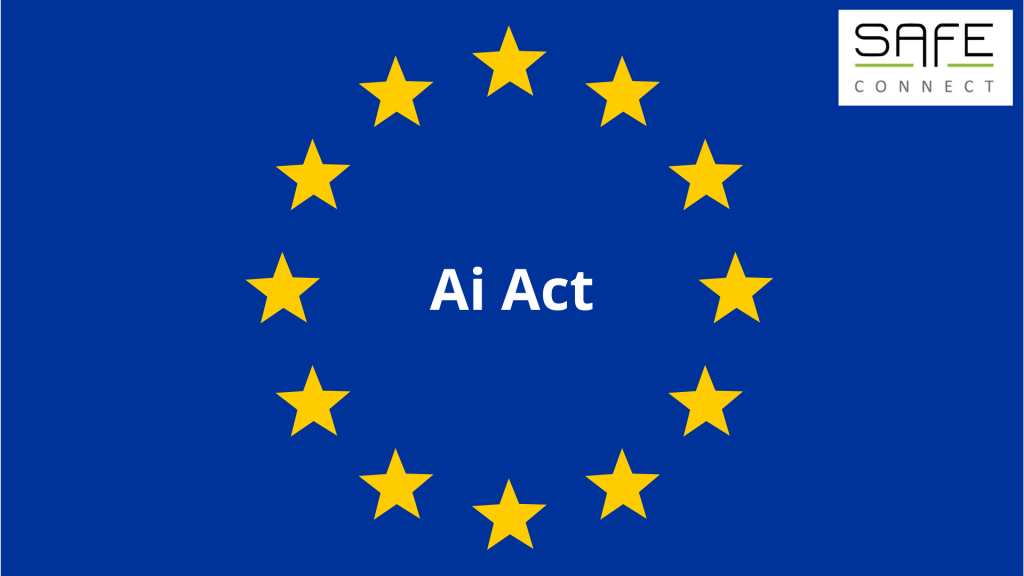
The European AI Act
Home » AI » The European AI Act
Time for a new chapter in AI regulation. After GDPR, the DMA and the DSA, Europe is taking another big step with the AI Act. But what does this law mean for your organisation and the future of artificial intelligence (AI) in Europe?
What is the AI Act?
The AI Act has been in force in Europe since 1 August 2024. The full rollout will be done in phases. The finishing line is expected on 2 August 2026. The goal is for artificial intelligence in Europe to remain safe, people-centred and ethical. How? By dividing AI systems into four risk categories, each with its own rules:
- Minimal risk
Think of applications such as spam filters and video games. No additional rules are needed here. - Limited risk
AI applications such as chatbots and deepfakes fall under this. Transparency is the main rule: make it clear when someone is talking to AI, as in the case of a chatbot. - High risk
This category includes AI systems that have a major impact on human lives, for example in self-driving cars or healthcare. Strict controls and human intervention are mandatory here. - Unacceptable risk
Technologies that are too risky, such as social scoring systems, are banned. They threaten our rights and are not allowed in the EU.
Why the AI Act?
AI offers great benefits, but also carries risks. What happens if AI makes a mistake during a medical procedure? Or if a self-driving car is involved in an accident? The AI Act establishes uniform rules that apply across Europe. This not only prevents legal chaos, but also strengthens consumer and business confidence.
The AI Act gives companies a clear framework to implement their technology safely and ethically. At the same time, it makes it easier to navigate through laws and regulations.
What does this mean for businesses?
From 2026, all organisations developing or deploying AI will be required to comply with the AI Act. Those who do not follow the rules risk fines of up to 7% of global turnover. Global companies should therefore prepare themselves if they want to remain active in Europe.
While the Act offers opportunities, there are also challenges. Small companies in particular are concerned about compliance costs, which can amount to 2.7% of their turnover. Nevertheless, the law offers long-term benefits, such as stronger confidence in AI and a level playing field within Europe.
The benefits of the AI Act
1. Ethical innovation: Through clear rules, the AI Act encourages responsible use of AI.
2. Transparency: Users know when they are dealing with AI, which increases trust.
3. Protection of rights: Technologies that threaten fundamental rights are banned.
4. Equal level playing field: One set of rules makes it easier to operate within Europe.
5. Consumer confidence: Safer and more reliable AI systems ensure wider acceptance.
The drawbacks of the AI Act
1. Cost of compliance: Smaller companies in particular face high costs to comply with regulations. These costs can be as high as 2.7% of turnover.
2. Risk of losing innovation: Some critics fear that strict regulations inhibit innovation, especially in startups and smaller markets.
3. Complexity: The AI Act introduces a range of technical and legal requirements that can be complicated for companies without specialised knowledge.
4. Competitive disadvantage: Strict regulations within Europe can make companies less competitive compared to regions where rules are more lenient, such as the US or China.
5. Phased implementation: Companies should be prepared for different deadlines, which causes complex planning.
How do you prepare?
To be compliant by 2026, it is important to take steps now:
– Determine risk category: Research which AI applications your organisation uses and which category they fall into.
– Ensure transparency: Make sure AI systems comply with transparency rules.
– Establish compliance processes: Check that your AI systems comply with the new requirements and document this accurately.
– Engage experts: Work with legal and technical specialists to mitigate risks.
What will the future bring?
From 2026, the rules of the AI Act will come into force. Companies that do not comply with the law risk high fines, up to 7% of their global turnover. At the same time, the law forces global companies to operate ethically if they want to continue operating in Europe. This is a one step towards a secure AI future.
You can find even more information on Ai Act on the official site of the European Commission